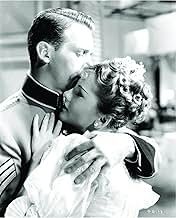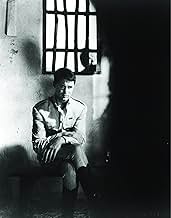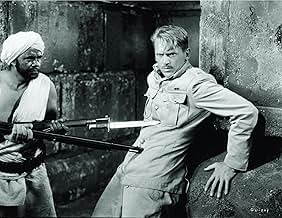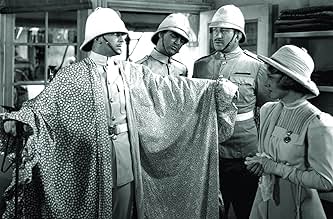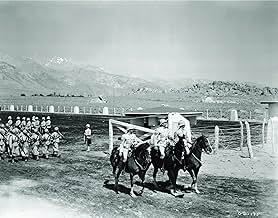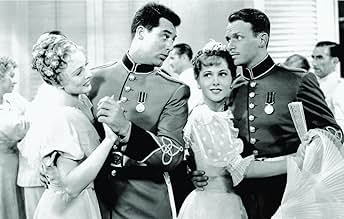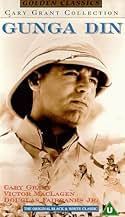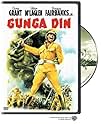Gunga Din
- 1939
- Tous publics
- 1h 57min
NOTE IMDb
7,2/10
13 k
MA NOTE
En Inde, au XIXe siècle, trois soldats britanniques et un porteur d'eau indigène doivent empêcher une renaissance massive et secrète du culte meurtrier des Thuggee avant qu'il ne puisse se r... Tout lireEn Inde, au XIXe siècle, trois soldats britanniques et un porteur d'eau indigène doivent empêcher une renaissance massive et secrète du culte meurtrier des Thuggee avant qu'il ne puisse se répandre dans tout le pays.En Inde, au XIXe siècle, trois soldats britanniques et un porteur d'eau indigène doivent empêcher une renaissance massive et secrète du culte meurtrier des Thuggee avant qu'il ne puisse se répandre dans tout le pays.
- Réalisation
- Scénario
- Casting principal
- Récompenses
- 4 victoires au total
Charles Bennett
- Telegraph Operator
- (non crédité)
Gene Coogan
- Lancer
- (non crédité)
Jimmy Dime
- Thug
- (non crédité)
George Du Count
- Pandu Lal
- (non crédité)
Anna May the Elephant
- Elephant
- (non crédité)
Avis à la une
Although I'm usually only mildly appalled reading through user comments on movies on imdb.com some of the comments made here about this classic movie exhibit a true nadir of ignorance of history in general and movies in particular. E.g.;
1 - I'm particularly struck by the comment - "This movie is shot on location in California because shooting in India would have been too expensive." Prior to the 1950's Hollywood movies were rarely (and I mean rarely) shot on the original location sites. The problem was not expense (although the moguls certainly were pinching the pennies), the problem was transportation! Transporting a movie production company halfway around the world would have been nearly impossible to accomplish (let alone how long it would have taken and then they would have been shooting under impossible conditions in India anyway) not to mention that WWII was on the verge of breaking out! The biggest movie of that year was shot on a set in Culver City, CA where they could easily manipulate the filming. Even if they had sent the production company to Atlanta they couldn't very well burn down Atlanta for authenticity' sake now could they? They would have had to have built a set(s) in Atlanta - why would they go all the way across the country to do that when they could do it Culver City?
2 - Several people lament that Gunga Din was not shot in color. A little movie history context here - first of all, the first full length feature film shot in color had only been done 4 years earlier, secondly three-strip technicolor was outrageously expensive in 1939 (only one other movie was shot that year in technicolor and it didn't start making back its costs until the late 1960's) and the few features shot prior to that year in color had failed miserably to make back their production costs. And finally, the studios had no faith in color (just as they had resisted "talkies" a decade earlier) - they were in business to make money, not experiment with an innovation that had not yet been accepted and proven to bring in a bigger audience. Also, there was a comment about the graininess of the B&W cinematography of GD - that's because 99% of the present day viewers are seeing multi-generation copies that have been played to death! Get a fresh, first generation copy to see the B&W shading in its true brightness, focus and clarity and that objection will go away. BTW - the colorized version of GD is abysmal - faded coloring effects and indistinct edges make it look like a sloppy water color painting!
3 - Labelling anything from the past as not being PC only shows the lack of historical context knowledge so rampant in the present day. First of all this movie was loosely based on a poem that was already 47 years old when this movie was released. If you change the politics to match the present day conception of "correctness" then you really don't have the original concept do you? Not to mention that America was a far different place racially (and socially) in 1939. There are movies being released in 2003 that will catch hell 50 years from now for their "politics" - just chalk it up to the ignorance of future generations to not recognize what the history of the times were. I do like the analysis by one writer though that far from being a reactionary screed the movie went further than the poem in emphasizing that Gunga Din was far better off in his position than he would have been otherwise. After all, he was an "untouchable", a social postion that was abused, exploited and terrorized by their fellow Indians for thousands of years. Whatever one might think of his treatment by the British it was a high step up from what he would have endured out in his own society! Which brings me to.........
4 - ..........the ridiculously misguided (and just plain wrong) observations about the Thuggees of India being "freedom fighters", this couldn't be more wrong. Several of the commentators really need to read up on Indian history - the Thuggees had been ritualistic murderers and thieves for thousands of years in India before the British ever arrived! If they had any support from various rulers of parts of India it was because those rulers either feared for their own positions or they could get the Thuggees to do their dirty work for them - for a high price of course. The Thuggees reputation for brutality, unabated crimes of the worst kind and general, overall lack of human attributes make most other singlemindedly evil groups throughout history (even in the present day) look like amateurs! The reason they fought the British so vociferously was that the British recognized this and fought to suppress them - I seriously doubt that many Indians lamented that suppression. And to the person who equated the Thuggees with French Resistance fighters killing "collaborators" - where did you get such a preposterous idea? Do you know anything at all about the history of the Indian sub-continent?
Let me also point out here that it is the British who are the infidels not the "natives", just another example of how mixed up one can be about who is who and understanding what history and meaning really are.
I especially love the reviewers who spend their time comparing this to another movie that they like better in order to dis this one - so they review the other movie instead. Why bother, movies stand on their own, you either like them or you don't, go watch the other one you like instead.
5 - Now, everyone is entitled to their opinion, which I certainly support, as to whether this is a "good" or a "bad" movie (opinions are like.......well, you know) but fergawdsakes base that opinion on an informed knowledge of the times, the historical context of the work and the realization that movies are just movies - they aren't "real" and they certainly make up whatever "truth" and "facts" they see fit!
My opinion? This is one of the great "entertainment" movies ever made - the reason to go to the movies I thought? It has everything - a good script, a good story, epic sweep, fantastic acting, inter-character chemistry, charisma, pacing and coherency. How many movies can you say that about? And kudos to those who see this movie for what it is, not what they want it to be!
1 - I'm particularly struck by the comment - "This movie is shot on location in California because shooting in India would have been too expensive." Prior to the 1950's Hollywood movies were rarely (and I mean rarely) shot on the original location sites. The problem was not expense (although the moguls certainly were pinching the pennies), the problem was transportation! Transporting a movie production company halfway around the world would have been nearly impossible to accomplish (let alone how long it would have taken and then they would have been shooting under impossible conditions in India anyway) not to mention that WWII was on the verge of breaking out! The biggest movie of that year was shot on a set in Culver City, CA where they could easily manipulate the filming. Even if they had sent the production company to Atlanta they couldn't very well burn down Atlanta for authenticity' sake now could they? They would have had to have built a set(s) in Atlanta - why would they go all the way across the country to do that when they could do it Culver City?
2 - Several people lament that Gunga Din was not shot in color. A little movie history context here - first of all, the first full length feature film shot in color had only been done 4 years earlier, secondly three-strip technicolor was outrageously expensive in 1939 (only one other movie was shot that year in technicolor and it didn't start making back its costs until the late 1960's) and the few features shot prior to that year in color had failed miserably to make back their production costs. And finally, the studios had no faith in color (just as they had resisted "talkies" a decade earlier) - they were in business to make money, not experiment with an innovation that had not yet been accepted and proven to bring in a bigger audience. Also, there was a comment about the graininess of the B&W cinematography of GD - that's because 99% of the present day viewers are seeing multi-generation copies that have been played to death! Get a fresh, first generation copy to see the B&W shading in its true brightness, focus and clarity and that objection will go away. BTW - the colorized version of GD is abysmal - faded coloring effects and indistinct edges make it look like a sloppy water color painting!
3 - Labelling anything from the past as not being PC only shows the lack of historical context knowledge so rampant in the present day. First of all this movie was loosely based on a poem that was already 47 years old when this movie was released. If you change the politics to match the present day conception of "correctness" then you really don't have the original concept do you? Not to mention that America was a far different place racially (and socially) in 1939. There are movies being released in 2003 that will catch hell 50 years from now for their "politics" - just chalk it up to the ignorance of future generations to not recognize what the history of the times were. I do like the analysis by one writer though that far from being a reactionary screed the movie went further than the poem in emphasizing that Gunga Din was far better off in his position than he would have been otherwise. After all, he was an "untouchable", a social postion that was abused, exploited and terrorized by their fellow Indians for thousands of years. Whatever one might think of his treatment by the British it was a high step up from what he would have endured out in his own society! Which brings me to.........
4 - ..........the ridiculously misguided (and just plain wrong) observations about the Thuggees of India being "freedom fighters", this couldn't be more wrong. Several of the commentators really need to read up on Indian history - the Thuggees had been ritualistic murderers and thieves for thousands of years in India before the British ever arrived! If they had any support from various rulers of parts of India it was because those rulers either feared for their own positions or they could get the Thuggees to do their dirty work for them - for a high price of course. The Thuggees reputation for brutality, unabated crimes of the worst kind and general, overall lack of human attributes make most other singlemindedly evil groups throughout history (even in the present day) look like amateurs! The reason they fought the British so vociferously was that the British recognized this and fought to suppress them - I seriously doubt that many Indians lamented that suppression. And to the person who equated the Thuggees with French Resistance fighters killing "collaborators" - where did you get such a preposterous idea? Do you know anything at all about the history of the Indian sub-continent?
Let me also point out here that it is the British who are the infidels not the "natives", just another example of how mixed up one can be about who is who and understanding what history and meaning really are.
I especially love the reviewers who spend their time comparing this to another movie that they like better in order to dis this one - so they review the other movie instead. Why bother, movies stand on their own, you either like them or you don't, go watch the other one you like instead.
5 - Now, everyone is entitled to their opinion, which I certainly support, as to whether this is a "good" or a "bad" movie (opinions are like.......well, you know) but fergawdsakes base that opinion on an informed knowledge of the times, the historical context of the work and the realization that movies are just movies - they aren't "real" and they certainly make up whatever "truth" and "facts" they see fit!
My opinion? This is one of the great "entertainment" movies ever made - the reason to go to the movies I thought? It has everything - a good script, a good story, epic sweep, fantastic acting, inter-character chemistry, charisma, pacing and coherency. How many movies can you say that about? And kudos to those who see this movie for what it is, not what they want it to be!
I have seen "Gunga Din" several times. It is not a strict re-telling of the Kipling work but a studio era take on it. It is jingoistic and hokey but it is an entertaining and uplifting film.
Those that bemoan the "un-PC" tone of the film need to look at it in context. The underlying theme of the piece is that these British soldiers come to hold a member of a group of people they had (until that time) regarded as savages, in higher regard than most of their compatriots. The ideas of universal human qualities and nobility are driven home in a very emotional, if a little ham-fisted way. Considering the racial atmosphere in America at the time, this was not exactly a statement without some daring.
To condemn this film or the original story for racism is to miss the point entirely. That was the time and for its time, the messages here are incredibly progressive. Besides, even if the film were racist, only a fool discards a classic piece of art because he or she disagrees with the content of the message. Pretty much all critics and film historians list Griffith's "Birth of a Nation" somewhere in the top 3 films of all time, regardless of the fact that the heroes of the picture are the KKK. The message was wrong but the film transformed the whole of film-making forever. Do we discard that too? Do we burn all copies of Joseph Conrad's novella "Heart of Darkness" because some perceive the narrator to be a bigot? To do so would be robbing generations of a classic example of well crafted storytelling at its best. Such behavior is ignorance in its basest form.
But, you know, that's just what I think.
Those that bemoan the "un-PC" tone of the film need to look at it in context. The underlying theme of the piece is that these British soldiers come to hold a member of a group of people they had (until that time) regarded as savages, in higher regard than most of their compatriots. The ideas of universal human qualities and nobility are driven home in a very emotional, if a little ham-fisted way. Considering the racial atmosphere in America at the time, this was not exactly a statement without some daring.
To condemn this film or the original story for racism is to miss the point entirely. That was the time and for its time, the messages here are incredibly progressive. Besides, even if the film were racist, only a fool discards a classic piece of art because he or she disagrees with the content of the message. Pretty much all critics and film historians list Griffith's "Birth of a Nation" somewhere in the top 3 films of all time, regardless of the fact that the heroes of the picture are the KKK. The message was wrong but the film transformed the whole of film-making forever. Do we discard that too? Do we burn all copies of Joseph Conrad's novella "Heart of Darkness" because some perceive the narrator to be a bigot? To do so would be robbing generations of a classic example of well crafted storytelling at its best. Such behavior is ignorance in its basest form.
But, you know, that's just what I think.
This movie was one of my favorites when I was growing up, and so when I bought the VHS tape a few months ago I was somewhat apprehensive about watching it again. I thought that maybe my memory of the film was a little sugar coated.
I was; however, pleasantly surprised to find that I still loved watching it as much as I did when I was a kid. It's a great action adventure movie. A previous reviewer commented on the lack of sophistication the movie conveys.
Whoever that guy is, he needs to lighten up. It's hard to look at for example the special effects and cinematography in an action adventure movie such as this when compared to the special effects and cinematography of Crouching Tiger Hidden Dragon. Time's have changed, and movies with them. If you keep that in mind while watching this film, and have a good time with it you'll love this movie.
I would love to see this come out on DVD, it's a great movie.
I was; however, pleasantly surprised to find that I still loved watching it as much as I did when I was a kid. It's a great action adventure movie. A previous reviewer commented on the lack of sophistication the movie conveys.
Whoever that guy is, he needs to lighten up. It's hard to look at for example the special effects and cinematography in an action adventure movie such as this when compared to the special effects and cinematography of Crouching Tiger Hidden Dragon. Time's have changed, and movies with them. If you keep that in mind while watching this film, and have a good time with it you'll love this movie.
I would love to see this come out on DVD, it's a great movie.
Among my father's favorite movies that I remember were High Noon, Four Feathers (both Korda's and the silent version), and this one. Not surprisingly they've all become favorites of mine. They are certainly the "guy flicks" of their day that wouldn't stand a chance of being made that way today. But I guess that's what makes them classics never to be forgotten, because, although all are classic stories, destined to be told again and again, they'll never be recreated in the original ways that made them classics.
Gunga Din has it all, and all, although dated and unapologetically un-PC, great stuff. To all the on target comments written about this movie, let me just add, the scenes leading up to and including the final battle are among the most moving in cinema. A gem of a movie. I can't hear the stir of (undeservedly unappreciated and maligned) bagpipes without remembering the thrill of this picture. It's timeless and wonderful.
Gunga Din has it all, and all, although dated and unapologetically un-PC, great stuff. To all the on target comments written about this movie, let me just add, the scenes leading up to and including the final battle are among the most moving in cinema. A gem of a movie. I can't hear the stir of (undeservedly unappreciated and maligned) bagpipes without remembering the thrill of this picture. It's timeless and wonderful.
10slokes
Anyone with a young boy in the house who won't watch black & white movies should put this on their television set. When the child walks by, wondering what all the on screen shouting and shooting's about, tell him this is a picture for adults and that he isn't big enough to watch it yet. That'll hold him there for a few minutes; director George Stevens and his team will keep him to the end.
I think my father did that to me, anyway, and I'm the better man for it. This classic adventure yarn, set in India during the British occupation, features a trio of Army sergeants who find their tight union facing dissolution as one prepares to marry his sweetheart. Help arrives in the form of a vicious Thuggie revolt that the soldiers find themselves united against.
"Gunga Din" was one of the great movies to come out of Hollywood's finest year, 1939. Even more than most great movies from that Golden year, it is entertaining in a very immediate and accessible way. The theme music is instant hummable nirvana. While shot in California, the camera work (the only thing in "Gunga Din" that got so much as an Oscar nomination) has a windblown grandeur that feels very much like the Raj of a hundred years before. The battle scenes are shot in a very realistic manner, not too violent but very messy as people fall and shoot and run in all corners of each frame in a way that feels real, not staged like some Cecil B. DeMille Biblical slaughter fest.
The script doesn't just set up action scenes, it also develops the relationship of the three sergeants with great dollops of humor. The main focus is on Sgt. Cutter, chasing after tall tales of golden treasures. It's a rare actioner for Cary Grant, and his lightness is just right for a film that never takes itself seriously even as it develops taut suspense.
Anchoring the trio is Sgt. MacChesney (Victor McLaglen), who dotes over his elephant Annie and tries to protect Cutter from his own hare-brained schemes. He's just as funny in his own way, leaving Sgt. Ballantine (Douglas Fairbanks Jr., displaying some nice Errol Flynnish dash) as the one with the love interest and grounding enough to know he needs to chuck his boyish pals and grow up.
If "Gunga Din" was a Lifetime movie, it would be about Joan Fontaine's efforts to save her man from his two loser friends and their skull crushing hijinks. But since it's a guys' film, the accent here is on how the threesome must stay together and save Ballantine from a fate worse than death, not only marriage, but as Cutter indignantly exclaims several times, the tea business, too.
The political correctness police are hard on this film, not so much for the gender issue but the idea of British soldiers saving poor Indians from the vicious Thuggies. It reeks of colonial apologia. Thankfully, this film was made back when, and the producers thus felt no need to spell out the obvious liberalism at the heart of the film, that these three sergeants, so full of derring-do and false racial pride, have to be saved along with the rest of their army by a humble bhisti that only one of the three had any time for when he sought their approval. After all, for all their swashbuckling glory, the film's true sacrifice involves the title character, played so heart-wrenchingly by Sam Jaffe.
Back when this film was made, movie mogul Jack Warner had a saying: You want to send a message, use Western Union. Still, it seems like the messages were flying fast and furious in "Gunga Din." I watch the film now and wonder if audiences back then were meant to wonder what Gunga Din was really up to when he led Cutter to the golden temple. Was he really plotting revenge against his British overlords? Would he have been justified in doing so, especially given MacChesney's cold treatment of him? When Col. Weed delivers that eulogy, the poem by Rudyard Kipling on which the film is loosely based, was it with a nod in the direction of imperialism's folly, of lording it over someone who proved "a better man than I am" in the end? What did they make of the Guru's great speech, delivered in perfect clipped English: "You have sworn an oath as soldiers to maybe die for a faith, which is your country, England. Well, I can die for my country and my faith as readily as you...India, farewell."
Of course, the same character also instructs his brutal followers: "Kill for the love of killing! Kill for the love of Kali! Kill! Kill! Kill!" Which means we are allowed to hate him and root for the British, and save the questions about what it all means for later.
What "Gunga Din" means to me, most of all, is the quickest, surest 90-minute thrill ride on video. Cutter never found his golden temple, but there's one for all of us watching "Gunga Din."
I think my father did that to me, anyway, and I'm the better man for it. This classic adventure yarn, set in India during the British occupation, features a trio of Army sergeants who find their tight union facing dissolution as one prepares to marry his sweetheart. Help arrives in the form of a vicious Thuggie revolt that the soldiers find themselves united against.
"Gunga Din" was one of the great movies to come out of Hollywood's finest year, 1939. Even more than most great movies from that Golden year, it is entertaining in a very immediate and accessible way. The theme music is instant hummable nirvana. While shot in California, the camera work (the only thing in "Gunga Din" that got so much as an Oscar nomination) has a windblown grandeur that feels very much like the Raj of a hundred years before. The battle scenes are shot in a very realistic manner, not too violent but very messy as people fall and shoot and run in all corners of each frame in a way that feels real, not staged like some Cecil B. DeMille Biblical slaughter fest.
The script doesn't just set up action scenes, it also develops the relationship of the three sergeants with great dollops of humor. The main focus is on Sgt. Cutter, chasing after tall tales of golden treasures. It's a rare actioner for Cary Grant, and his lightness is just right for a film that never takes itself seriously even as it develops taut suspense.
Anchoring the trio is Sgt. MacChesney (Victor McLaglen), who dotes over his elephant Annie and tries to protect Cutter from his own hare-brained schemes. He's just as funny in his own way, leaving Sgt. Ballantine (Douglas Fairbanks Jr., displaying some nice Errol Flynnish dash) as the one with the love interest and grounding enough to know he needs to chuck his boyish pals and grow up.
If "Gunga Din" was a Lifetime movie, it would be about Joan Fontaine's efforts to save her man from his two loser friends and their skull crushing hijinks. But since it's a guys' film, the accent here is on how the threesome must stay together and save Ballantine from a fate worse than death, not only marriage, but as Cutter indignantly exclaims several times, the tea business, too.
The political correctness police are hard on this film, not so much for the gender issue but the idea of British soldiers saving poor Indians from the vicious Thuggies. It reeks of colonial apologia. Thankfully, this film was made back when, and the producers thus felt no need to spell out the obvious liberalism at the heart of the film, that these three sergeants, so full of derring-do and false racial pride, have to be saved along with the rest of their army by a humble bhisti that only one of the three had any time for when he sought their approval. After all, for all their swashbuckling glory, the film's true sacrifice involves the title character, played so heart-wrenchingly by Sam Jaffe.
Back when this film was made, movie mogul Jack Warner had a saying: You want to send a message, use Western Union. Still, it seems like the messages were flying fast and furious in "Gunga Din." I watch the film now and wonder if audiences back then were meant to wonder what Gunga Din was really up to when he led Cutter to the golden temple. Was he really plotting revenge against his British overlords? Would he have been justified in doing so, especially given MacChesney's cold treatment of him? When Col. Weed delivers that eulogy, the poem by Rudyard Kipling on which the film is loosely based, was it with a nod in the direction of imperialism's folly, of lording it over someone who proved "a better man than I am" in the end? What did they make of the Guru's great speech, delivered in perfect clipped English: "You have sworn an oath as soldiers to maybe die for a faith, which is your country, England. Well, I can die for my country and my faith as readily as you...India, farewell."
Of course, the same character also instructs his brutal followers: "Kill for the love of killing! Kill for the love of Kali! Kill! Kill! Kill!" Which means we are allowed to hate him and root for the British, and save the questions about what it all means for later.
What "Gunga Din" means to me, most of all, is the quickest, surest 90-minute thrill ride on video. Cutter never found his golden temple, but there's one for all of us watching "Gunga Din."
Le saviez-vous
- AnecdotesThe gong in the title sequence is the same one used to summon King Kong six years earlier.
- GaffesBallantine and MacChesney are bound and gagged when the last Thuggee is about to behead them after Gunga Din sounds the alarm. Cutter shoots the Thuggee and Ballantine and MacChesney are unbound as they rush to Cutter's side.
- Citations
Sgt. Thomas 'Tommy' Ballantine: You displease me greatly, and I ignore the both of you.
- Crédits fousThe credits appear on a gong. Standing next to the gong is a Hindu man, and every time he strikes the gong, the credits change.
- Versions alternativesGerman theatrical version was cut by approx. 12 minutes. This version was later shown on TV but never released on any home media format. Only in 2018 the film was released on DVD, with approx. 4 minutes restored.
- ConnexionsFeatured in Les Corps sauvages (1959)
Meilleurs choix
Connectez-vous pour évaluer et suivre la liste de favoris afin de recevoir des recommandations personnalisées
- How long is Gunga Din?Alimenté par Alexa
Détails
- Date de sortie
- Pays d’origine
- Langue
- Aussi connu sous le nom de
- Aufstand in Sidi Hakim
- Lieux de tournage
- Société de production
- Voir plus de crédits d'entreprise sur IMDbPro
Box-office
- Budget
- 1 910 000 $US (estimé)
- Durée1 heure 57 minutes
- Couleur
- Rapport de forme
- 1.37 : 1
Contribuer à cette page
Suggérer une modification ou ajouter du contenu manquant



